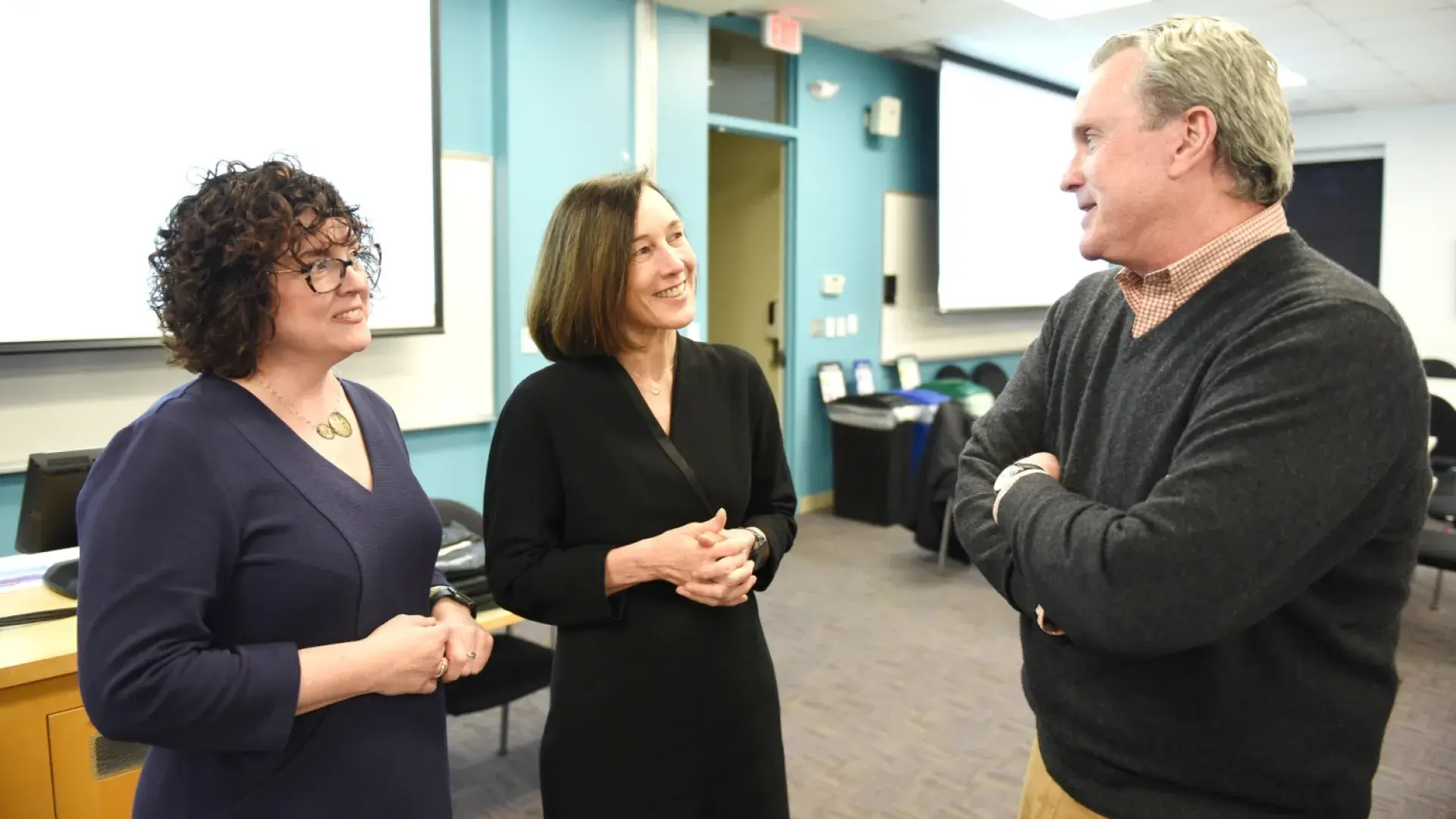
New collaborative to explore possibilities in treatment, research, scholarship, and education
If two heads are better than one, then so are two institutions - especially when it comes to advancing the field of gerontological and palliative nursing care.
MGH Institute of Health Professions has formally partnered with the Massachusetts General Hospital’s division of Palliative Care and Geriatric Medicine to examine what might be possible in the areas of treatment, research, scholarship, and education.
“Sometimes, before you know someone, you don't know what opportunities are there,” said Dr. Ruth Palan Lopez, Associate Dean of Research in the MGH Institute’s School of Nursing and an expert in gerontological nursing. “So, then you could say, ‘Oh, wow. We're both trying to do the same thing. Let's combine forces and try to work together on that project.’”
That’s what led to the first in-person meeting of the Gerontological Palliative Care Collaborative (GPCC), a formal collaboration between nurses, educators, scholars, and clinicians who have a passion for and expertise in palliative care and geriatrics. The group met earlier this month in the Shouse Building where they began the conversation about collaboration.
“I'm excited about it,” said MGH nurse practitioner Sindhura Pulluru, who was standing with 2013 IHP SON graduate Alison Kavanaugh before the GPCC meeting began. “Usually, we focus mainly on clinical work, which is especially important, but I think this will help us combine our interests of teaching and research and collaborate with experts at the IHP. I just think it's a great idea.”
The GPCC is the brainchild of SON Dean Ken White, who has made strengthening the relationship with MGH a priority since becoming dean.
“These partnerships are exactly what we need to be doing,” said White, whose specialty is palliative care. “This is an opportunity to pool resources and expertise to really move the needle in this field.”
To move that needle, the GPCC will bring together experts from the IHP and MGH who will work together in both clinical and scholarly activities.
“MGH can also come up with the research ideas because their clinicians’ hands are on the patients, so they have the most salient questions to ask,” said Palan Lopez. “We can partner with them to help answer those questions.”
Another focus of the collaborative is the student experience and encouraging a career in the geriatric and palliative care field, especially given there aren’t enough nurses in this space to meet future needs.
“The hope is that we’re helping to develop clinicians that are going to have passion, and skill in these areas of medicine and nursing,” said Simone Rinaldi, Nursing Director for the Division of Palliative Care and Geriatric Medicine at MGH. “I think the field of palliative care and geriatrics has not always had the attention that it deserves. Having quality opportunities for students, with good mentorship will hopefully attract them to the field.”
A point echoed by one of Rinaldi’s colleagues at MGH, who was also at the GPCC meeting.
“A big part of the benefit to having students spend time with our group is that our program has both inpatient and outpatient treatment so they can see how geriatric nursing and medicine is delivered in different settings within one division,” said Christine Ritchie, MD, MSPH, who is the Kenneth L. Minaker Chair in Geriatrics and Director of Research for the Division of Palliative Care and Geriatric Medicine at Massachusetts General Hospital (MGH). “It’s a unique opportunity for IHP students.”
Sarah Rossmassler, IHP assistant professor of nursing, says the GPCC will allow students to see up close the exceptional and extensive care provided by MGH, whose Division of Palliative Care and Geriatric Medicine had more than 24,000 inpatient and outpatient encounters last year.
“They have a really robust inpatient service, a geriatrics team, a home care team, and now they're starting an inpatient palliative care unit. So, it can be a great resource to help connect our students to what’s being done at the hospital,” she said.
Rinaldi points to the nurse practitioner’s unique position, with one foot in nursing and another in medicine, and how that interpretive role for patients can be explored through this partnership.
“I think that there's something powerful and not yet fully examined about the nurse practitioner experience that needs to be researched and written about,” said Rinaldi. “This collaboration allows us to develop a pathway that helps move nurse practitioners out of solely the clinical realm and into scholarship which will allow them to disseminate more broadly what they know about patients and good palliative and geriatric care.”
As the GPCC gears up for regular meetings and a focus on what to tackle first, organizers like Palan Lopez are thrilled at beginning another internal partnership with Mass General Brigham.
“As we are moving toward a more unified MGB, the IHP is being recognized as a critical element in the MGB system,” said Palan Lopez. “Our school has a lot to offer MGH and the Mass General Brigham system.”
Do you have a story the Office of Strategic Communications should know about? If so, email ihposc [at] mghihp.edu.
